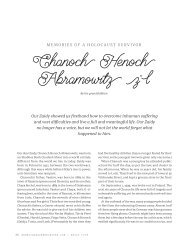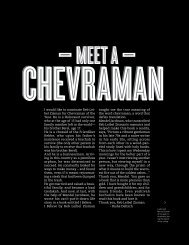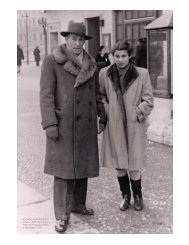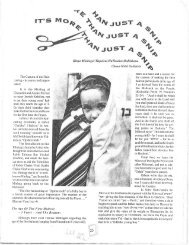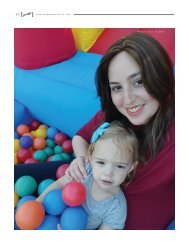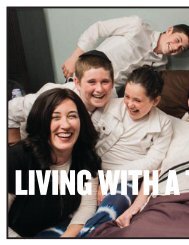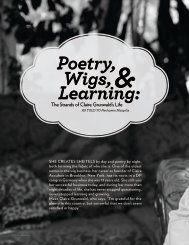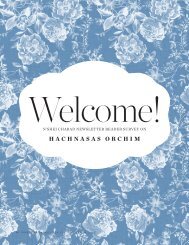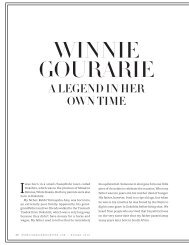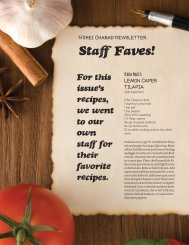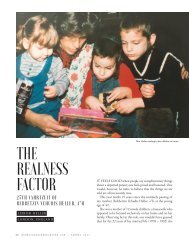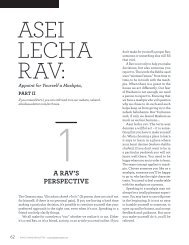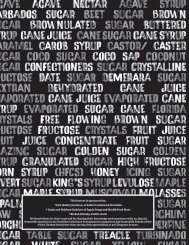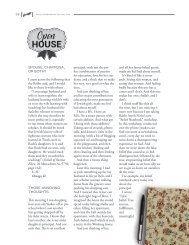Create successful ePaper yourself
Turn your PDF publications into a flip-book with our unique Google optimized e-Paper software.
people don’t want to use any processed<br />
food. Regarding processed<br />
food, some only use the bare minimum,<br />
and some consider oil to be<br />
in the category of bare minimum.<br />
Also, take into account that some<br />
foods are more processed than others<br />
(more about this later). The Alter<br />
Rebbe’s Shulchan Aruch states that<br />
oil made of kitniyos is forbidden.<br />
There is a debate whether, since<br />
kitniyos oil was forbidden, all nonkitniyos<br />
oil should be forbidden as<br />
well so that people will avoid confusing<br />
the two. The Alter Rebbe’s<br />
Shulchan Aruch states clearly, in<br />
parentheses, that this is not the case.<br />
In America before the nesius, our<br />
Rebbe was asked which oil Anash<br />
use for Pesach. The Rebbe wrote<br />
in a telegram in English (reprinted<br />
and translated in Hebrew in Igros<br />
Kodesh XXI:96), “Anash use Nutola<br />
[name of a company] fat.” Some<br />
have a tradition not to use oil, but<br />
we cannot say it is forbidden.<br />
IS IT IMPORTANT TO AVOID<br />
MILK AND DAIRY PRODUCTS ON<br />
<strong>PESACH</strong>?<br />
Some avoid dairy on Pesach because<br />
of the processed foods issue.<br />
Additionally, there is a halachic discussion<br />
regarding milk from cows<br />
that ate chometz on Pesach, especially<br />
if they were milked within 24<br />
hours of the time they ate chometz.<br />
Today this issue is usually not relevant<br />
because the milk we receive<br />
is from cows milked before Pesach.<br />
Furthermore, at many cholov Yisroel<br />
dairies, workers stop feeding<br />
the cows with chometz for a period<br />
of time before Pesach. Nevertheless,<br />
some people continue to keep<br />
the old minhagim despite technological<br />
changes today. As we said<br />
earlier, it is written in sichos that<br />
the Rebbe Rashab drank milk on<br />
Pesach.<br />
WHY DO SOME PEOPLE AVOID<br />
EATING PROCESSED FOOD ON<br />
<strong>PESACH</strong>? IS THIS CONNECTED<br />
WITH NOT EATING OUTSIDE ONE’S<br />
OWN HOME?<br />
The custom not to eat in others’<br />
homes on Pesach is a minhag mentioned<br />
in many sources, including<br />
the writings of the Sefardi ga’on,<br />
Rabbi Chaim Palaggi (who passed<br />
away over 150 years ago). Some<br />
link this with the korban Pesach<br />
where only “members” who were<br />
“subscribed” in advance were permitted<br />
to eat from the korban of<br />
each group. In fact, the Gemara<br />
mentions that everyone brought<br />
their own knife! The prevailing<br />
Chabad custom dating from the<br />
Alter Rebbe (described in Hayom<br />
Yom) is not to offer visitors food on<br />
Pesach, but to allow them to help<br />
themselves. The Frierdiker Rebbe<br />
explains that we do not put any<br />
pressure on the visitor because he<br />
might have hiddurim. He may be<br />
willing to eat at one home but not<br />
at another, and we don’t want to<br />
offend anyone, host or guest. The<br />
Rebbe once wrote to someone that it<br />
is not recommended to travel away<br />
from home for Pesach because it is<br />
difficult to be mehader in someone<br />
else’s home.<br />
Our Rebbe’s bris took place on<br />
Chol Hamoed Pesach at the home of<br />
his grandfather, Rabbi Meir Shlomo<br />
Yanovsky, Rav of Nikolayev. A chossid,<br />
Reb Asher Grossman, didn’t<br />
want to eat at the bris. The Rav told<br />
him, “You really deserve a serious<br />
telling off for refusing to eat at the<br />
home of the Rav, but I can’t give it<br />
to you because you saved my life.”<br />
When Rav Meir Shlomo was deathly<br />
ill with typhus, Reb Asher stood<br />
outside the door and read aloud<br />
one particularly inspiring chapter<br />
of Tanya (Iggeres Hakodesh Ch.<br />
11) day after day, giving the Rav<br />
the spiritual strength to continue<br />
fighting for his life.<br />
Clearly, the Rebbe’s grandfather<br />
felt this chossid was being<br />
unduly machmir under the circumstances.<br />
We can learn from it the<br />
importance of striking the proper<br />
personal balance in our conduct on<br />
Pesach.Pesach is a family holiday<br />
when people are home. Moreover,<br />
the mitzvah from the Torah for a<br />
father to teach his son about Pesach<br />
is achieved more successfully at<br />
home than away.<br />
The question of eating outside<br />
one’s own home is compounded in<br />
the case of processed food (depending<br />
on the product and hechsher).<br />
Processed food has not only been<br />
made outside of our home; it has<br />
been processed in a commercial<br />
setting. When a sh’ailah arises on<br />
processed food, a serious financial<br />
loss can sometimes occur for<br />
the company, and thus a Rav might<br />
have to be lenient according to halachah<br />
due to the monetary loss. Of<br />
course, this issue is equally relevant,<br />
or even more relevant, to those<br />
who participate in the Pesach getaways<br />
at hotels. Kashering a hotel<br />
is a complicated process and a very<br />
high level of vigilance and supervision<br />
is required if everything<br />
produced in the premises is to be<br />
totally acceptable.<br />
Some processed foods are so<br />
clean that one almost can’t go wrong<br />
in buying them. In fact, sometimes<br />
the processed food has less chance<br />
of being chometzdik than the<br />
home-made version. Other foods,<br />
APRIL 2014<br />
89




